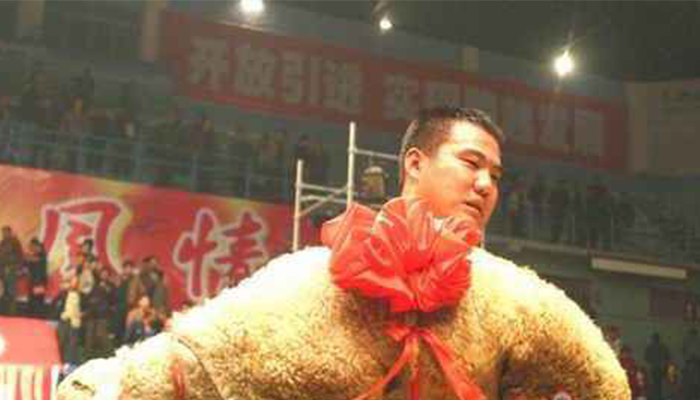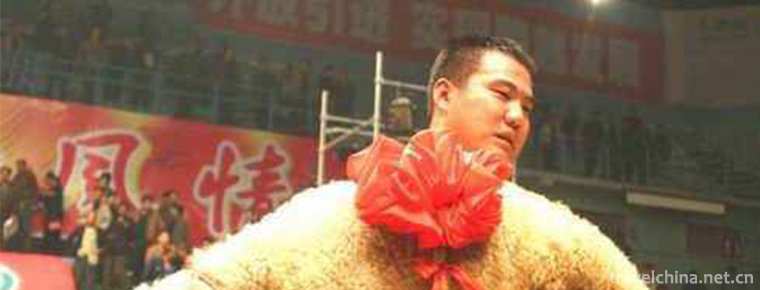Scratch sheep race
Scratch sheep race
The Naoyang Competition is a traditional Chinese folk custom activity mainly in Xinzhou City, Shanxi Province. It's a wrestling competition with a live sheep as a prize. In the countryside, "scratching" is interpreted as "carrying" and "scratching sheep" is carrying sheep and pulling them away. So "scratching sheep competition" means winning or losing sheep competition.
On June 7, 2008, Naoyang Race was approved by the State Council to be included in the second batch of national intangible cultural heritage list.
Historical Legends
The use of sheep as a prize in wrestling competitions is handed down from the Chinese people. According to legend, in the Yuan and Ming Dynasties, Xinzhou had abundant aquatic plants, which was an ideal place for sheep herding. At that time, the wrestling activities often used sheep as a bet to win or lose in wrestling. At first, there was no special organization, just wrestlers want to throw away, want to gamble, over time, it evolved into a prize for sheep and some people organized a competition.
In wrestling competitions, wrestlers usually wear wrestling clothes. In the scratching sheep competitions in Xinzhou, wrestlers do not wear wrestling clothes. They went to battle barefoot and dressed casually in long and short clothes. In the actual combat of wrestling, because the upper body is BARE-BACKED and there is no place to catch each other, they can catch each other.
Places are concentrated in the lower body, but can not grab pants, who grabbed each other's pants, even if who lost. But it's permissible to grab the belt on your pants. In the actual competition, the participants in the scratching sheep race never need to tie their belts with leather, but only use a hemp seedling silk. Once the hemp seedling silk is broken, the race must stop. Only after replacing a pair of trousers and fastening the hemp seedling silk can the race continue.
rule
The wrestlers in the scratch-sheep race win or lose by a fall. Except that the wrestlers and footboards are standing on the ground, the other parts of the body can lose as soon as they touch the ground. They don't play a round-robin race. The losers are eliminated and the winners continue to compete with the novices. If three opponents fall in succession, they will be encouraged accordingly after the match. When five opponents were thrown down in succession, the winner was regarded as a "hero" and was given considerable encouragement after the match. When the sixth opponent falls down successively, people call him a scratcher. They give the highest award to the scratcher and give the winner a big white sheep prize.
In the scratching competition, the wrestler wins five in a row and becomes a hero in people's minds. These five and six are a long-term Chinese folk custom which was formed by the Enlightenment of General Guan Yu of Shuhan in the ancient Three Kingdoms. However, it is not easy to "cut six generals through five passes". On the scratching field, both sides are attacking and both sides are defending. The wrestlers not only need superb skills, but also both sides have off-the-field guidance and use their wisdom. Often, when the wrestlers are on the same level, there is a situation of all-night struggle.
There are temple fairs in the urban and rural areas of Xinzhou, but they are bound to scratch the progress of sheep competitions, which will undoubtedly add luster to the temple fair and attract many audiences from all sides. There is a local proverb that "if you don't wrestle in a hurry, you will see fewer people, you will see fewer singing operas and wrestling, and all the villages and villages will see the excitement." In the area of Xinzhou, there are many times of meeting in a year. Within a hundred miles around Xinzhou, there are four or fifty times in a year. All these temple fairs will have sheep scratching competitions. In addition to the scratching competitions held at Temple fairs, special scratching competitions are also organized at leisure. There are local proverbs: "Autumn is set up, HOEs are hoed, melons are eaten, theatres are watched, wrestling cattle are herded". This is enough to show that farmers regard wrestling as a major event, not to be ignored. Most of the sheep scratching competitions in the leisure time after the autumn harvest are between larger villages and stronger wrestlers. Of course, this kind of competition needs to invite other villagers to be judges and notaries.
Many days before the event, the host village released the news of "scratching sheep race". The wrestling ground was chosen on a broad threshing ground or in front of the stage. A big flag and two small flags were erected on the field. On the flag, eight words were written on each side: "The hero falls innocent of falling to death". After the founding of the People's Republic of China, it was written as "peaceful wrestling, do not harm people", until today's "friendship first, competition second". Whether in the past or now, the two flags are for the wrestlers to pull out, and the people who pull the flag must be the "scratching man" who once carried the sheep. The two men who drew the wrestling flag became the representatives and masters of both sides in the wrestling competition. Of course, they also need to divide the preliminary wrestlers of Team A and Team B through the head of the host village or notaries through joint consultation. The Yuanping Temple Fair is held on July 15 of the lunar calendar every year. The sheep scratching competition was held in Yuanping Town. At that time, it will be the wrestling competitions in Xinzhou, Dingxiang and Yuanping counties. The level of these three counties'wrestling competitions is much higher than that between villages and villages, and the competitions are much more exciting. This kind of high level wrestling competition often makes the number of temple fair increase sharply, brings strong stimulation to people's spirit, and spreads sensational news in the climax of the competition.
Inheritance and Development
Local folk custom, scratching sheep race mostly in the evening, in the past lighting equipment backward circumstances, can only light, and lighting people also followed the wrestling two opponents ran around. Sometimes, wrestling in front of the stage and singing opposite to the performance of the opera, all of a sudden, the audience turned to the wrestling arena, around the wrestling arena, sitting on the ground, riding on the wall, climbing trees, sitting on bricks, stones, crowds, a pair of eyes glaring round, to the splendid spot of wrestling, cheers burst out, and a sensational storm swept over the ground. Naturally, the actors there are still performing, but they have to be distracted and squint at the wrestling results.
Competition prizes
The prizes of "scratching sheep competition", whether they are fat sheep or other prizes, are paid by the host villages and towns. Naturally, such expenditure is collective money, or the cost of raising funds.
The climax of the "scratching sheep race" is that after a "scratching sheep man" won six wrestlers in a row, people let the winner wear red flowers and send the sheep to his side, ride a big horse, circle the field for a few weeks, and eat a rich wine banquet, then be escorted out of the village to go home. At the same time, the name of the winner will be recorded in the annals of history and will be remembered for future generations.
The scratching sheep competition has been circulating in Xinzhou, Yuanping and Dingxiang for thousands of years, and has become a mass sports activity, which attracts people's attention.
Other correlations
According to legend, before the Northern Song Dynasty, people in Xinzhou Prefecture liked wrestling, but at that time, wrestling was limited to general entertainment activities. In the Southern Song Dynasty, after the murder of Yue Fei, a famous national hero and anti-Jin general, a veteran of Xinzhou nationality returned to his hometown. The veteran never forgot his ambition to resist the Jin Dynasty, so he passed on the martial arts skills of boxing and wrestling learned in the army to his local villagers. Because of the historical conditions at that time, the martial arts were prevalent, which was his skill of resisting the Jin Dynasty, and also his skill of self-defense. Over time, it became a local folk tradition. At that time, Xinzhou had abundant aquatic plants and a lot of sheep raising. Because of these conditions, it developed into a "scratching sheep competition" and flourished.


-
1.Shanghai Science and Technology Museum
Shanghai Science and Technology Museum is a comprehensive natural science and technology museum with Chinese characteristics, times characteristics and Shanghai characteristics
Time 2018-12-05 -
2.Nanxun ancient town Scenic Area
Nanxun Ancient Town is located in Nanxun District of Huzhou City, at the junction of Jiangsu, Zhejiang and Shanghai provinces.
Time 2018-12-07 -
3.Asihatu Stone Forest
Chaihe Tourist Scenic Spot has a total area of 1368.7 square kilometers, which is a national 5A tourist scenic spot. The area of Alshan City in Xing'an League is 7408.7 square kilometers, and Chaihe T
Time 2019-01-02 -
4.Lushan Karst Cave Group Scenic Area
Yiyuan Karst Cave Group is located in Nanlushan Town, 7 kilometers northwest of Yiyuan County. It has been proved that there are more than 100 caves in the area of 5 square kilometers around the ape-m
Time 2019-02-06 -
5.Teochew woodcarving
Chaozhou woodcarving is a Chinese folk sculpture art, mainly used for architectural decoration, artifact decoration, furniture decoration, desk decoration, etc. After careful carving
Time 2019-04-16 -
6.Legend of Yellow Crane Tower
The legend of the Yellow Crane Tower has a long history, and has been accompanied by the repeated destruction and construction of the Yellow Crane Tower
Time 2019-05-04 -
7.Kimchi Making Skills Korean Kimchi Making Skills
Kimchi of Korean nationality is one of the traditional food with the most national characteristics of Korean nationality, and its pickling method is constantly enriched and developed. In the long hist
Time 2019-06-09 -
8.Bai Juyi
Bai Juyi (772 - to - 6), Le Tian, the number of Xiangshan residence, and Mr. drunken Yin, whose ancestral home is Taiyuan, Shanxi. And moved to his great grandfather. Lower jaw Born in Henan Xinzheng
Time 2019-09-06 -
9.Beijing Electronic Science and Technology Institute
Beijing Electronic Science and Technology Institute is a general university which trains specialists in information security and office automation for Party and government organs at all levels. The Co
Time 2019-09-06 -
10.Meishan Sports
In 2019, 45 games will be held and 30000 people will participate in the games. At the end of the year, there were 116 sports associations. By the end of the year, there were 1410 sports venues in the education system. Meishan post and telecommunication
Time 2020-12-18 -
11.Yibin medical and health
By the end of 2019, there are 5120 medical and health institutions in Yibin City, including 135 hospitals (102 private hospitals); 4945 primary medical and health institutions, including 177 township health centers, 46 community health service centers (stations),
Time 2020-12-18 -
12.Dazhou culture
Baqu culture refers to the fact that Dazhou city is located in Bashan canal and belongs to Badi in ancient times. The chapter of Baqu customs is listed in the ancient book Taiping Huanyu Ji thousands of years ago; the second refers to the unique cultur
Time 2020-12-20